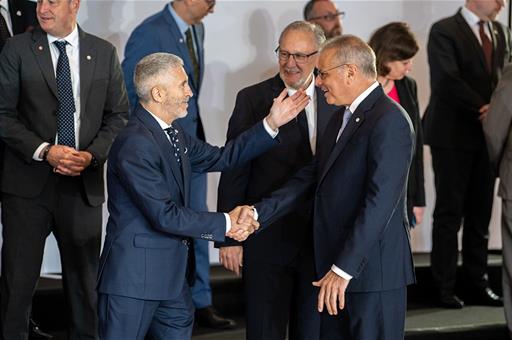Grande-Marlaska asks the EU to increase funding for migration cooperation projects in Africa
News - 2022.7.11
The Minister for Home Affairs, Fernando Grande-Marlaska, has asked the European Union to increase European funds earmarked for migration cooperation programmes in African source and transit countries for migration. "They need regular, predictable and substantial assistance, which has so far been insufficient," he said in Prague during the informal meeting of the Council of Home Affairs Ministers, which he attended accompanied by the Secretary of State for Migration, Isabel Castro.
Grande-Marlaska specifically mentioned the Neighbourhood, Development and International Cooperation Instrument (NDICI), which dedicates 10 per cent of its funds to migration. "We must make the most of the possibilities offered by this budget and implement migration cooperation projects that have already proved their effectiveness in third countries", he told his European counterparts.
Along the same lines, the Minister for Home Affairs insisted on "raising the political profile and presence of the European Union" in migration source and transit countries. "There is an urgent need to strengthen political dialogue with our African partners and to have greater dialogue between representatives of the EU and the Member States", he explained, expressing his appreciation for the recent visit to Rabat (Morocco) of the Commissioner for Home Affairs, Ylva Johansson, to meet with the Moroccan Minister of the Interior, Abdelouafi Laftit.
Grande-Marlaska referred to the "structural nature" of the migratory phenomenon affecting the European Union in his speech. "The pressure from Africa will not go away, but we must continue to work to prevent and reduce movements and move towards fair, predictable and orderly migration management," he said.
Ukraine and the fight against child sexual abuse
The war in Ukraine featured prominently at the Prague Council, which discussed the impact of the conflict on the EU's internal security among other issues.
In addition to the importance of reinforcing borders to combat organised crime, Grande-Marlaska drew attention to "the most vulnerable victims of this conflict - women and children - who are the targets of criminal organisations" and called for an increased effort to implement the protocols and specific anti-trafficking measures envisaged in the European Union.
The minister also stressed the need to intensify actions to protect the country's cultural heritage and prevent its plundering.
In the area of combating the sexual abuse of minors via the internet, he reiterated Spain's proposal to host the future EU centre dedicated to preventing and combating these crimes. "If the debate on its location is opened, Spain will continue to bid to host it. We believe that the experience accumulated by Spanish police forces in this field is an endorsement and a guarantee of success," he explained.
Meetings on the Migration and Asylum Pact
Within the framework of the Council held in Prague, Grande-Marlaska held a bilateral meeting with Fernando López Aguilar, Chairman of the European Parliament's Committee on Civil Liberties, Justice and Home Affairs, to address issues related to the processing of the future Migration and Asylum Pact.
The legislative roadmap of the migration pact was also the focus of a joint meeting with the ministers of France, the Czech Republic, Sweden and Belgium, countries involved in the rotating presidency of the EU over the coming months. Finally, Grande-Marlaska met with his Moldovan counterpart, Ana Revenco.
Non official translation





